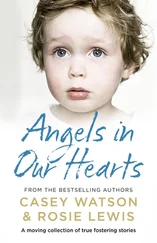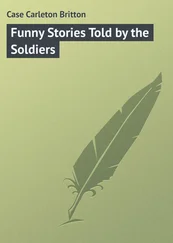“Harry, can we save this cake for tomorrow?” she heard her father saying.
In the middle of the night, Irene woke where she’d thrown herself on the bed. She heard a soft splash, the splash of a tiny fish, she thought, because she was having the dream where she breathed with giant lungs underwater as she swam with a large school of fish that tickled her with their flicking tails. But there was another, louder splash that was not part of her underwater dream. She walked over to the sliding-glass window and pushed back the curtain. The pool glowed like mercury in the dark, and Clara held George with giant arms as he floated on the water’s surface, blowing bubbles into the water. Harry stood at the pool’s edge while Emmy Lou and Dolly paced, toenails clicking against the cement and their eyes on Clara. The three of them looked up and saw Irene standing behind the sliding-glass window. They motioned for her to come down.
“She’s teaching me to use my lungs to their best capacity,” George called up.
Irene did not yell down that she knew he already knew how to swim, that she had seen him hold his breath for what seemed like hours in contests with Myra, who always came up for air too soon. She looked at Clara’s long arms — they could still carry her far under the ocean past barnacled rocks, past the fish and seaweed visible from the surface, to water so blue it was black, to a place where there were animals no one had ever seen before.
She looked at George and remembered a yellow afternoon on the island where she was born, Myra watching George cut the still-beating heart out of a tautog and place it in Irene’s open palm. This was not a story told to her by her parents, not one she remembered fully except for the tiny boom of a heart in her hand. Irene watched her father with his face in the water. The map, under the leg of the yellow and orange chair, rustled in the night air. In the water, George, like the dorado, was turning color. Under the pool lights he was becoming a fluorescent yellow so bright it was as if he were glowing from the inside out, his insides almost visible in the brightness. Irene slid the glass door open and stepped out onto the balcony, waiting for the tiny booming heart, the heart of her first memory, to tell her the rest of her life.
LUCY fingered the strands of the dead man’s hair before she sealed the envelope, sticking the prickly ends up her nose to see what the dead man must have smelled like, but the hair smelled mostly like formaldehyde and shampoo.
The program didn’t return the ashes of the donor; the cremains were scattered at sea with the cremains of hundreds of other donors. Lucy was supposed to use this word— cremains —whenever she spoke to potential donors or their next of kin. Her boss, Mildred, insisted. Mildred was the sort of woman who was always insisting. So far, in the month Lucy’d been at this job, she’d used the word in conversations with cousins, grandsons, granddaughters, husbands, wives, sons, and brothers. “You do understand that we are unable to return the cremains to the family,” Lucy would say as earnestly as she could. She practiced saying it to her reflection in the sleeping computer. Cremains was a word Lucy imagined had been invented by the same clever ad guy who came up with Craisins, the snack food combination of cranberries and raisins.
“Cremains,” Lucy whispered as Mildred gathered her purse and coat on her way out of the office to one of her alleged all-day meetings. Mildred turned quickly, hoping to catch Lucy midwhisper, but she never could. This time Lucy played dumb by neatening a stack of Instructions for the Disposition of Remains forms with concentrated intensity.
“Cremains,” again, as Mildred put her hand on the door-knob. Mildred spun around, but Lucy coughed and began to hum like a grade school delinquent.
“I’m very sorry for your loss,” Mildred reminded her. Whenever Mildred suspected Lucy of something, she lectured her on etiquette. “You always forget that part when you speak to potential donors. Read it off the cheat sheet if you have to. I know you’re a temp, Lucy, but you’re a long-term temp, and you really should practice good phone manners.”
Lucy wasn’t very good at any of the primary duties of her job — answering the phone, filing, copying forms like the Vital Statistics sheet, delivering papers to the morgue — but she and Mildred both knew that it would be hard to replace her. There weren’t very many people willing to work in such close proximity to the dead, or almost dead. Even Mildred was looking for a transfer. Podiatry or neurosurgery, she’d told Lucy in a rare moment of intimacy that had sliced through the dull hum of the office’s fluorescent lights. The way Mildred’s face tightened after she revealed this, as if she were willing the confession back into her mouth, Lucy understood not to point out the vagueness of Mildred’s desires.
“Got it,” Lucy said to Mildred, now waiting at the door for confirmation of her hanging-by-a-thread authority.
“Good,” Mildred said. She slammed the door behind her for punctuation. She tried to storm off, but her coat got caught and jerked her back. She opened the door again without looking at Lucy, pulled her coat out, and then stormed off.
Alone in the small, windowless basement office of the university’s medical center, Lucy pictured piles of ashes, piles like chimney soot, aboard a barge headed out into the Pacific. A barge like a giant ashtray, which reminded her of the tiny piles of ashes all over her apartment. Since arriving in San Francisco a little over a month ago, Lucy had been living in an apartment with two French girls who needed a third to make the rent. The girls never brushed their hair and were nonchalantly, effortlessly beautiful. They ate only bread and chocolate yet remained mysteriously, aggressively svelte in their American designer jeans. They chain-smoked, ashing in or on anything available — crumb-filled plates, Lucy’s potted plant, windowsills. Ash floated constantly in the toilet bowl, unflushed.
Lucy copied Release of Claim forms, sorting them into careful piles. She made copies of the informational packet. There were certain medical conditions that prevented people from donating their bodies to science. Medical students needed to work on “clean” bodies, as Mildred liked to explain over and over again as if it were an incantation, as if by saying this she could ward off hepatitis, HIV, tuberculosis, Creutzfeldt-Jakob disease, whatever that was. Lucy figured she still had a good fifty, sixty years to go in her own body. She appreciated the muscle in her licking tongue, the smell of her arm, an earthy smell that she had, until just the other day, attributed to her cross-country lover until she realized that it was the smell of her own epidermis (Lucy liked to use medical terms on the job). She imagined small fossils of her life lodged in the sedimentary layers of her epidermis, secretly and forever, tiny gifts to herself.
Lucy heard Brenda’s mail cart in the hallway. She quickly ducked beneath her desk, fixed her face in the maniacal way she practiced whenever she went to the bathroom, and popped up when Brenda opened the door. Brenda, who hadn’t thought this was funny the first five times, barely flinched. Without a word, she threw the mail on the chair beside the door and resignedly rolled her cart away.
Since she’d started working at the whole-body donation program, the French girls’ tiny piles of ash had started to creep Lucy out. This morning before work, she had asked them to smoke outside the apartment.
“But zese new American laws,” the thinner, dirtier, slightly more beautiful one protested, suddenly bursting into English, having barely uttered a non-French word since Lucy met her. “If we cannot smoke een our own houze, where would we zmoke?”
Читать дальше












